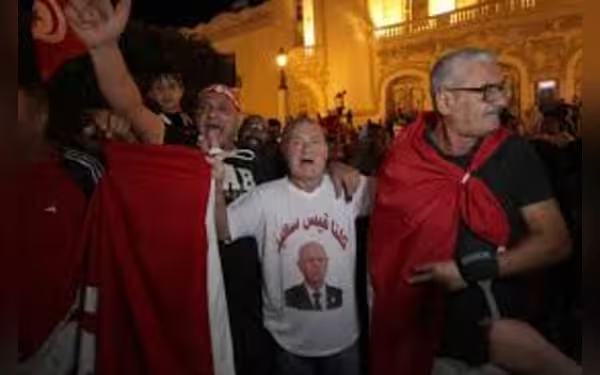Saturday, November 16, 2024 05:53 PM
UN Raises Concerns Over Political Oppression in Tunisia
- UN condemns jailing of political opponents in Tunisia.
- Kais Saied re-elected amid low voter turnout.
- Over 100 arrests highlight crackdown on dissent.
 Image Credits: thefrontierpost
Image Credits: thefrontierpostThe UN expresses concern over political oppression in Tunisia as Kais Saied is re-elected amid a crackdown on opposition voices.
The political landscape in Tunisia has recently come under scrutiny as the United Nations expressed its concerns regarding the ongoing presidential election campaign. This campaign has been described as being "marred" by a significant crackdown on opposition voices. Tunisia, known as the birthplace of the Arab Spring, has seen its democratic processes challenged, raising alarms both locally and internationally.
In a recent announcement, the ISIE electoral authority revealed that Kais Saied was re-elected as president with an overwhelming 90.69 percent of the votes. However, this victory comes amidst a backdrop of low voter turnout, which many interpret as a sign of widespread discontent among the populace. The situation is further complicated by the fact that 14 candidates were barred from participating in the elections, while others faced imprisonment. This has led to serious questions about the fairness of the electoral process.
UN human rights chief Volker Turk highlighted the troubling nature of these developments, stating, "Such cases are troubling. Their trials indicate a lack of respect for due process and fair trial guarantees." This statement underscores the growing concern over the treatment of political opponents in Tunisia. Out of 17 potential candidates, only three were allowed to run, while many others faced arrest and lengthy prison sentences on various charges.
Moreover, the crackdown has not been limited to presidential candidates. Over 100 individuals, including campaign members and political figures, have been arrested on charges ranging from falsification of electoral paperwork to issues related to national security. Turk urged the Tunisian authorities to protect the democratic processes and uphold fundamental freedoms, emphasizing the importance of accountability and redress for past abuses.
Since the 2011 revolution, Tunisia has been viewed as a beacon of hope for democracy in the region. However, recent actions, including the arrest of the former head of the Truth and Dignity Commission, have raised fears that the gains made in the past are being eroded. Rights groups are particularly worried that Saied's re-election will solidify his control over the only democracy that emerged from the Arab Spring protests.
Turk also pointed out the increasing pressure on civil society, which has seen numerous journalists, human rights defenders, and political opponents targeted. He called for Tunisia to recommit to transitional justice and to implement necessary rule of law reforms in line with international human rights standards. This includes respecting freedoms of expression, assembly, and association.
The situation in Tunisia serves as a critical reminder of the fragility of democratic institutions. As the country navigates these turbulent waters, it is essential for both the government and the international community to prioritize the protection of fundamental rights and freedoms. The path forward must involve a commitment to justice and accountability, ensuring that the voices of all Tunisians are heard and respected. Only then can Tunisia hope to reclaim its status as a leader in democratic governance in the region.













